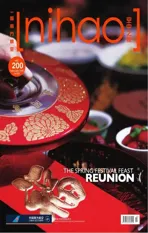这厢有礼
2016-04-17Peter,Leo,ZengJian等
这厢有礼
RED IS THE WARMEST COLOUR
喜庆的包装、吉利的意头、相伴的祝福……春节礼物是一种含蓄的语言和信号,我们把情谊与心意深深地饱含其中。
Festive packaging, auspicious meanings together with blessings…the Chinese New Year gift is a subtle language and symbol, enveloping profound friendship and kinship.
Text by Peter Translation by Leo Photo by Zeng Jian, Chen Yihang, Wang Yusheng & CFP


Besides special decorations and delicious food, gifts make a good reason for us to look forward to the Spring Festival when old and young at home or at work will exchange gifts expressing their best New Year wishes to each other.
“Gong Hey Fat Choy” in Cantonese (“Gong Xi Fa Cai” in Mandarin or “Congratulations and Prosperity” in English) is one of the most heard phrases in Guangdong during the Chinese Spring Festival.With this greeting often comes one of the most important gifts during the festival Ð “Hong Bao” or “Li Shi” (“red envelope”) which means good fortune in the New Year.The term could be found in The Book of Changes and A Study on Customs and Proverbs, a book written during the Yuan dynasty (1271-1368).
Red envelopes decorated with auspicious patterns and lucky words did not come into widespread use until several decades ago.Previously, people cut a large piece of red paper into small squares in which copper coins or cash was wrapped.That's why many elderly people still say “red paper” instead of the more popular name of “red envelope”.In days when copper coins were used, the elderly would often wrap in the red paper dozens of copper coins or a silver coin, symbolising “longevity” and “a ten thousand-fold pro fi t with a small capital”, respectively.After paper money appeared, people preferred to put new banknotes in sequential order into red envelopes as a symbol of their wishes for kids to make progress in their studies.
Generally, giving red envelopes is a “married privilege”.At home, married people should give red packets to children (and this can be done any time on or before the Lantern Festival); between friends, the married should give red envelopes to singles; when dining out, diners should give tips to waiters or waitresses (remembering tipping is not a social norm in China); and the fi rst day back at work from Spring Festival holidays, employees are often given a red packet by their employers.All these mean the same thing Ð to wish a very smooth year ahead.
Now more people of Guangdong choose to give practical items such as New Year presents to their families and friends, though some traditional customs of giving small gifts as a token of friendship and love are also well preserved.
When paying a visit to a friend or relative's house, you'd better take with you some tangerines.In Cantonese dialect, “Gan” (tangerine) and “Jin”(gold) are homophones, so are “Ju” (tangerine) and “Ji” (lucky).So giving tangerines as gifts is to wish one good luck and good fortune.Nevermind the amount of tangerines you take, be sure that the number is not odd.When you take leave, your host will keep two of the tangerines and give two of his own to you as a symbol of exchanging wishes for a good fortune.Therefore, the tradition of visiting relatives, friends and others during the Chinese Spring Festival is said, among the masses, to be a “tangerine exchange movement”.So some joked that if one left home with two tangerines in his pocket, he came back home with two new ones.
As lineage plays an important part in their lives, the Cantonese will always remember to prepare special gifts for their ancestors at this time of the year.On the fi rst day of the Lunar New Year, many traditional families will pick an auspicious hour to hold an ancestral worship ceremony on which fresh fl owers, tea, liquor and food are offered and family members pay honour and respect to ancestors according to seniority.
“恭喜发财”是春节期间在广东出现频率最高的一句话,伴随这句问候语的是春节中最重要的礼物——利是。“利是”即为红包,又称“利事”“利市”,取其大吉大利、好事连连之意。“利市”一词早在《易经》中便有记载,带有本少利多的意思。元代《俗谚考》亦提及“为了吉兆,要向主家讨个利市”的说法,由此可见,利市亦有好运的意义。
现在常见的印有吉祥话的利是封其实只有数十年的历史。以前人们是用一大张红纸裁成小方块,然后把钱包在红纸里,封成利是,所以到了今天还是有很多老人家以“红纸”作为利是的代名词。旧时,给长辈的红纸里会包一百文铜钱,寓意“长命百岁”,放一枚银元的红纸则寓意“一本万利”。改为纸币后,长辈们喜欢将票面号码相连的新钞票包给孩子,祝愿他们“连连高升”。
一般来说派利是是已婚人士的“特权”,从大年初一到元宵节前都可派发。过年派利是,目的是花钱花得开心。利是派出去的时候,一定要见到笑脸。新年期间,除了长辈为孩子派发利是,给未婚的朋友派利是,去酒楼吃饭为服务员派发利是,节后上班的第一天,公司还会派开工利是,取其凡事顺利的意头。
拜年的人,无论带多少礼物,柑桔都是不可少的。由于广东话“柑”与“金”、“桔”与“吉”谐音,送柑桔就表示吉利。柑桔多少没有关系,但不能是奇数。临走时,主人会从来者的礼物中留下两个,然后取出自家柑桔交换,意在互赠吉祥。因此,民间有称年初的拜年礼俗为“换柑运动”。这样的送礼习俗也被有人幽默的称拜年者只需在裤兜里装上两个柑桔,一一拜年后,裤兜里依然是装着两个柑桔不变。
